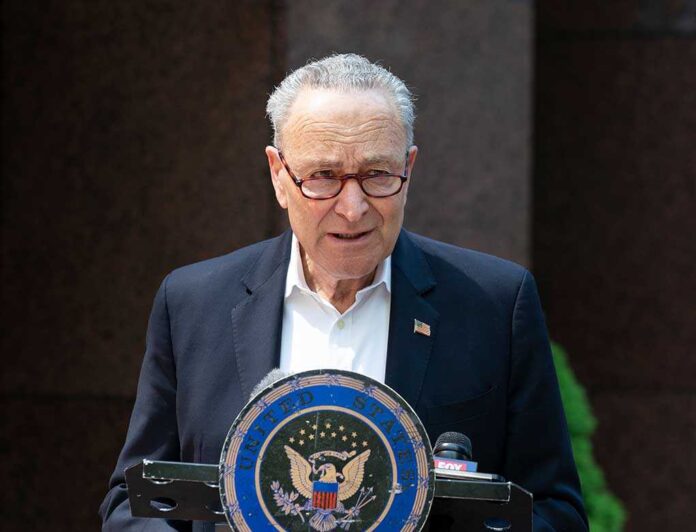
Speaker Mike Johnson’s bold maneuver to bypass Senate Majority Leader Chuck Schumer has ignited the fiercest constitutional showdown yet, putting the future of responsible government—and conservative principles—on the line.
Story Snapshot
- Speaker Johnson leads House Republicans to circumvent Senate in historic government shutdown fight.
- Record-breaking shutdown exposes deepening partisan and institutional divides in Washington.
- Federal workers, military families, and small businesses face mounting hardships amid legislative gridlock.
- Conservatives demand accountability as Senate Democrats and Schumer resist compromise and negotiation.
Speaker Johnson’s Stand: Defending Conservative Values Against Senate Inaction
On November 4, 2025, Speaker Mike Johnson and House Republicans escalated their campaign to end the longest government shutdown in U.S. history, launching a direct challenge to Senate Majority Leader Chuck Schumer’s grip on the legislative process. Johnson’s strategy reflects rising frustration among conservatives, who see Senate inaction and Democratic obstruction as threats to limited government, fiscal responsibility, and constitutional order. By seeking alternative legislative routes, Johnson aims to restore accountability and break a cycle of political gamesmanship that has paralyzed Washington for too long.
The unprecedented nature of Johnson’s move signals a major departure from business as usual in Congress. Traditionally, the Senate’s leadership holds significant sway over the fate of spending bills and shutdown resolutions. Johnson’s willingness to bypass these norms underscores deep-seated distrust between the chambers and within both parties. Conservatives argue that a return to fiscal discipline and respect for the will of voters is impossible as long as entrenched Senate leadership resists reform and transparency. The ongoing standoff has become a flashpoint for Americans demanding an end to “woke” spending and government overreach.
Consequences for American Families and Constitutional Governance
As the shutdown drags on, its real-world impacts are being felt by federal employees, military families, and small businesses—constituencies long championed by the conservative movement. Missed paychecks, disrupted services, and regulatory delays are deepening public frustration, fueling calls for leaders to uphold their constitutional duties and put the country ahead of partisan posturing. Many believe that unchecked Senate obstruction risks not only economic harm but also the erosion of trust in representative government. The current crisis highlights the urgent need for leadership rooted in traditional values, respect for the Constitution, and a commitment to restoring limited government.
At the same time, the White House and advocacy groups have accused both sides of engaging in political theater at the public’s expense. However, conservatives counter that Senate Democrats and Schumer in particular have repeatedly ignored the will of the people and the foundational principles that underpin American society. This standoff is not merely about budget numbers—it is a test of whether Congress will defend the rights of citizens against bureaucratic overreach and reckless spending agendas that have driven inflation and undermined economic stability.
Breakdown of Regular Order: What It Means for the Future of Congress
Speaker Johnson’s decision to circumvent Schumer marks a potential turning point in congressional power dynamics. The breakdown of traditional inter-chamber negotiation reflects years of mounting polarization and the failure of the Senate to act on pressing fiscal and policy issues. For constitutional conservatives, this moment represents a defense of the separation of powers and a pushback against efforts to centralize authority in the hands of a few Senate leaders. The risk, however, is that continued gridlock could set a precedent for future shutdowns and deepen institutional dysfunction, threatening the very fabric of self-government.
Mounting Pressure, Political Fallout, and the Path Forward
With no clear legislative breakthrough in sight, public pressure on both parties is intensifying. Johnson and Republican leaders have held multiple briefings to hold Schumer and Senate Democrats accountable, while Democrats warn of the shutdown’s growing harm. Policy analysts and advocacy groups warn that repeated shutdowns undermine America’s economic stability and global reputation, but for many conservatives, the real danger lies in surrendering to fiscal irresponsibility and ignoring the core values that made America strong. The coming days will test whether Congress can return to regular order, respect the Constitution, and restore trust in government—or whether partisan gridlock will become the new normal.
Speaker Johnson Plans to Go Around Schumer to End Shutdown Fight https://t.co/4CDeVqggsh
— Highlands County GOP (@HighlandsGOP) November 5, 2025
Ultimately, the shutdown fight is about more than temporary inconvenience—it is about the future direction of the country. Conservatives across the nation are watching to see if principled leadership, grounded in respect for the Constitution and American families, can prevail over entrenched interests and political posturing. The stakes could not be higher as Congress confronts a moment of truth for representative democracy in America.
Sources:
White House Government Shutdown Clock
Politico reporting on shutdown developments




























